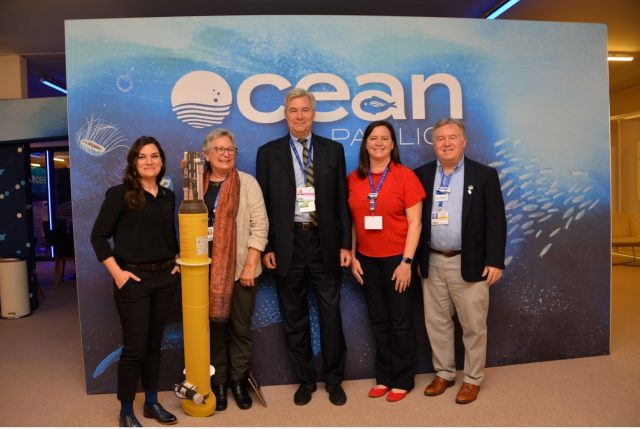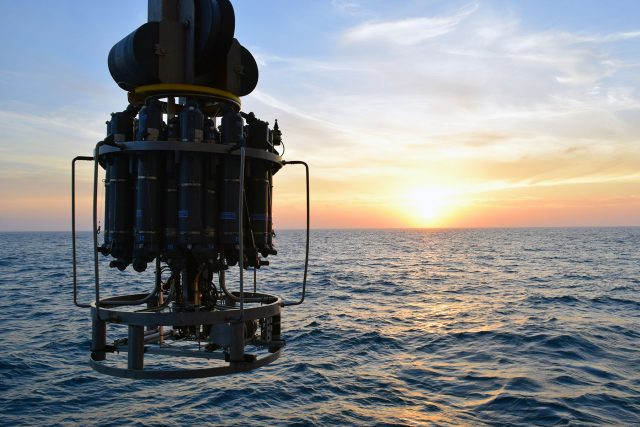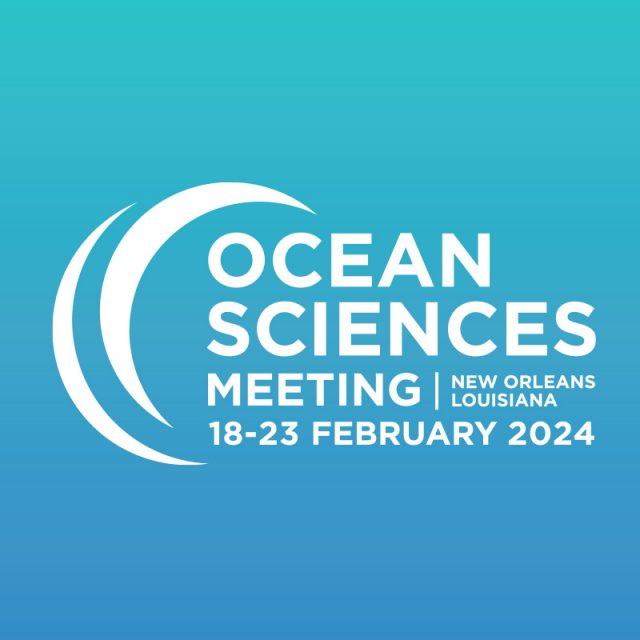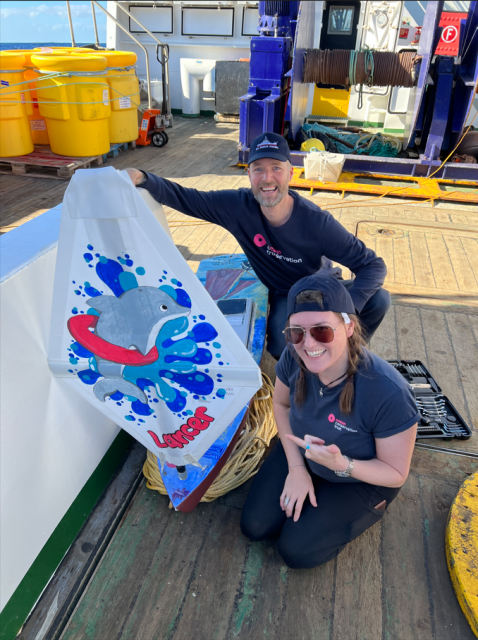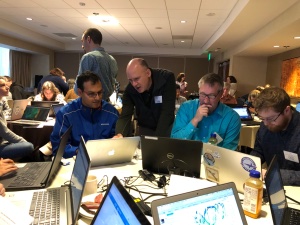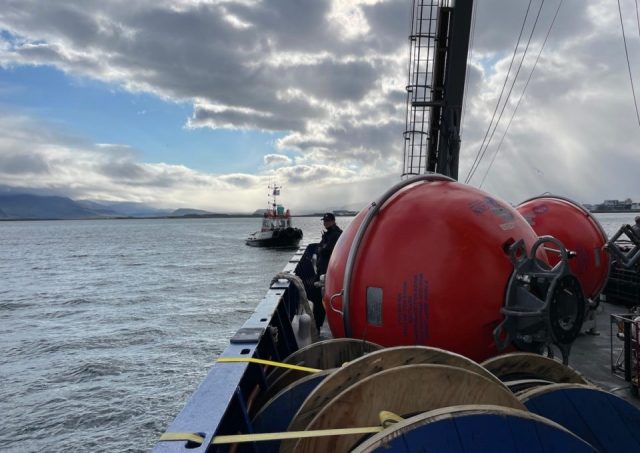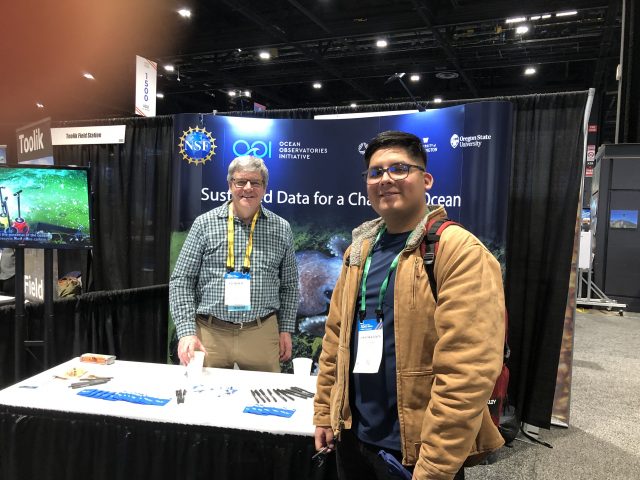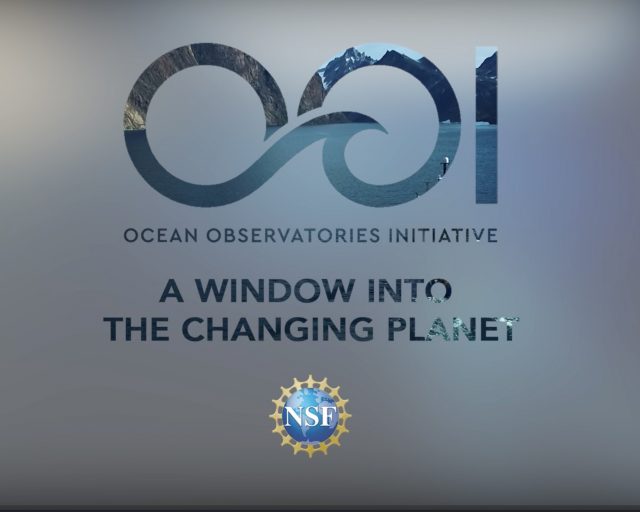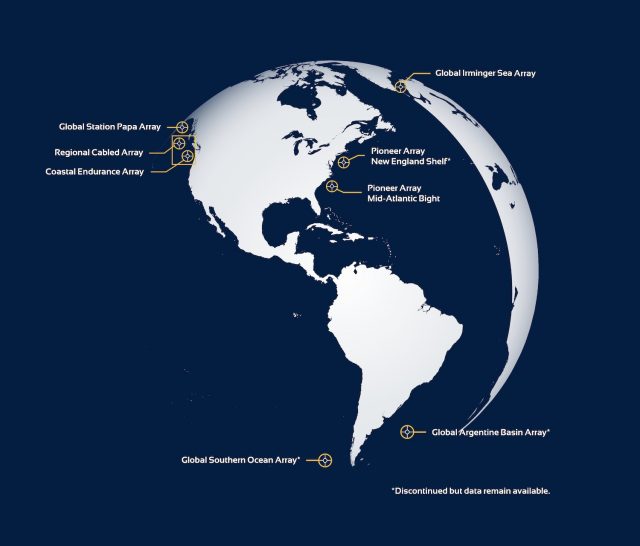Posts by Darlene Trew crist
Edson Showcases OOI at COP 28
Ocean Observatories Initiative (OOI) Principal investigator Jim Edson spent a week in Dubai at COP 28 (28th meeting of the United Nations Climate Change Conference) as part of the contingent representing Woods Hole Oceanographic Institution (WHOI) at the Ocean Pavilion. While at the second Ocean Pavilion, co-hosted with Scripps Institution of Oceanography, Edson participated in a panel discussion on marine heat waves and a side event on the importance of ocean observing. When not presenting, Edson met with international colleagues and helped staff the booth, answering questions and engaging with an international audience interested in the ocean’s role in addressing climate change.
“COP28 was an amazing coming together of the international community to try to figure out a way to address the many pressing climate-related problems now being experienced all over the world. It provided a platform for island nations such as Tonga, which is losing its territory in real time to sea level rise to share real life examples of climate change happening now. It was sobering and serious work, and one where finally the important role of the ocean was recognized,” he said.
“It is important that OOI be visible on the world stage so all those who can use our data to advance knowledge are aware of its existence and encouraged to use to help find answers to their own research questions,” he added.
Edson was one of five presenters at a side event held at one of COP 28’s larger auditoriums. The side event was entitled Global Ocean Observations for Equitable Knowledge-based Decision-making and included panels on ocean observing and policy. He led off the ocean observing panel with a report on OOI and how its data are advancing understanding of the changing ocean, while stressing that purposeful observation, collaboration, capacity building and stakeholder engagement are critical to address the climate challenges effectively and equitably. Edson was joined by Kilaparti Ramakrishna, Director of Marine Policy Center and Senior Advisor to the President on Ocean and Climate Policy at WHOI; Carol Anne Clayson, Director of Research Strategies and Innovation at WHOI; Lynne Talley, Distinguished Professor of Oceanography at Scripps Institution of Oceanography; and Helen Findlay, Professor at the Plymouth Marine Laboratory. The ocean policy panel included Edward Hill, Chief Executive of the National Oceanography Centre (NOC); Paula Sierra-Correa, Co-Chair of the International Oceanographic Data and Information Exchange (IODE) 2023-2025 and Research and Information Coordinator; and Sophie Seeyave, CEO of the Partnership for Observation of the Global Ocean (POGO). The side event was recorded and can be watched here.
[media-caption path="https://oceanobservatories.org/wp-content/uploads/2024/01/Side-event.jpg" link="#"]The side event on importance of ocean observations participants (from left) Helen Findlay, Lynne Kelly, Kilaparti Ramakrishna, Carol Anne Clayson, and Jim Edson. The panel on ocean policy at the side event included Edward Hill, Paula Sierra-Correa and Sophie Seeyave. Credit: ©WHOI.[/media-caption]Edson also was a participant during a panel discussion at the Ocean Pavilion on marine heat waves: A Heated Case for Ocean Observations. Marine heatwaves are a significant ecological and socioeconomic threat, worldwide, and have been increasing in both duration and frequency, a trend that is likely to continue. This session focused on how sustained ocean observations can help understand and predict these phenomena so that mankind can prepare for, and mitigate, their effects.
Edson represented OOI on the panel and provided examples of how OOI data have been used to identify marine heat waves using presentations from Coastal and Global Scale Nodes Lead Scientist Al Plueddemann and Coastal Endurance Array Lead Scientist Ed Dever. Other panelists were Kelly Oskvig, Senior Program Officer, National Academies Sciences, Engineering, Medicine; Lynne Talley, Professor, Scripps Institution of Oceanography, UC San Diego; Sofia Darmaraki, Principal Investigator, Foundation for Research and Technology – Hellas, Greece; and Tammy Russell, PhD Student, Scripps Institution of Oceanography. Opening comments were provided by the Honorable Sheldon Whitehouse, US Senator from Rhode Island. The panel was recorded and can be watched here.
[media-caption path="https://oceanobservatories.org/wp-content/uploads/2024/01/Marine-heat-waves.jpg" link="#"]The panel on marine heat waves included (from left)Tammy Russell, Lynne Talley, US Senator Sheldon Whitehouse, Kelly Oskvig, and Jim Edson.Credit: ©WHOI.[/media-caption]
The importance of the ocean’s role in climate change and why it must be a key topic at COP28, and future discussions was captured in an editorial opinion piece written by Peter de Menocal, president and director of the Woods Hole Oceanographic Institution, and Margaret Leinen, vice chancellor for marine science and director of the Scripps Institution of Oceanography/University of California San Diego, co-sponsors of the COP28 Ocean Pavilion. They cite additional ocean observations as a vital component moving forward.
https://oceanographicmagazine.com/features/the-ocean-our-greatest-ally-in-tackling-climate-change/
Read More
Water Sample Data Available thru BCO-DMO Repository
Hydrographic sampling performed by the Ocean Observatories Initiative (OOI) as part of each Array turn represents a significant collection of valuable physical, chemical, and biological information. In addition to the CTD (conductivity, temperature, depth) casts themselves, collected hydrographic data from bottle samples include discrete oxygen, salinity, nutrients (nitrate, nitrite, silicate, phosphate, ammonium), chlorophyll, and carbon system measurements. These data are subsequently merged into a concatenated “discrete summary” file with quality assessment flags and an associated readme file detailing important notes about the data. Although the primary purpose of these data are for the evaluation and validation of deployed OOI instrumentation, the annual (Global) or biannual (Coastal) collection of data at the same locations provides a unique time series of water properties following established community standards and methods.
Currently, OOI discrete water sampling data are made available via the OOI Alfresco Web Document Server and via the OOI Data Explorer. Water sampling data served through these platforms are organized so each dataset represents a single cruise at a specific Array.
Recent efforts within the ocean observing community have focused on improving FAIR (Findable, Accessible, Interoperable, Reusable) Data practices from programs and projects, such as the Marine Ecological Time Series (METS-RCN)-hosted international workshop on FAIR Data Practices for Ship-based Ocean Time Series. As part of the OOI’s effort to improve FAIR data practices, OOI is working with the Biological & Chemical Oceanography Data (BCO-DMO) Management Office to make the water sampling data collected during OOI operation and management cruises available via the BCO-DMO website and database. BCO-DMO curates publicly available research-ready oceanographic data in accordance with FAIR data principles.
[media-caption path="https://oceanobservatories.org/wp-content/uploads/2023/08/CTD_at_sunset-640x427-1.jpg" link="#"]A CTD Rosette frame being lowered into the Atlantic Ocean from the R/V Neil Armstrong at sunset. Credit: Rebecca Travis © WHOI.[/media-caption]Re-distributing OOI data through BCO-DMO will enhance the FAIR qualities of OOI Discrete CTD and water sample data by: (1) providing a robust version control strategy that assigns DOIs (Digital Object Identifiers) as these datasets are updated; (2) making the data available to a larger audience, for use in novel science research beyond the intended scope of instrument validation; (3) concatenating the cruise-by-cruise data into a single dataset that is more readily available for analysis; and (4) providing machine-to-machine interoperability by making data available through an ERDDAP server.
Starting from the BCO-DMO home page, OOI water sampling data will be available as part of the “OOI Program Page” as the project “OOI Discrete CTD and Water Sampling Cruise Data.” Within the BCO-DMO data management system, water sampling data for each array will be organized into a single, concatenated data table. For example, the OOI Argentine Basin CTD and Water Sampling Data, which spans all four Argentine Basin mooring turn cruises (AT26-30, AT39-03, NBP1510, NBP1609) from 2015-2018, are currently available here.
This distribution of OOI data is but one example of OOI’s continuing quest to make its data available in multiple ways so that the data are broadly used to advance understanding of ocean processes.
Read More
OOIFB Town Hall at Ocean Sciences Meeting: Feb 20
~ Announcement ~
OOI Facilities Board Town Hall at the 2024 Ocean Sciences Meeting
February 20, 2024, 12:45 – 1:45pm Central Time
The Ocean Observatories Initiative Facilities Board (OOIFB) will host a Town Hall at the 2024 Ocean Sciences Meeting on Tuesday, February 20, 2024, from 12:45 pm to 1:45 pm Central Time. The community will have the opportunity to hear the latest information about the Ocean Observatories Initiative (OOI) facility, including an update on the relocation of the Pioneer Array; learn about NSF updates; and meet the OOIFB members. The second half of the Town Hall will consist of an interactive, panel discussion- Enhancing your Science with OOI Data: A Community Discussion about Maximizing OOI Data Use. The goal of this community-focused conversation is to discuss how current OOI data access and usage can be refined and/or expanded to better meet research and education goals.
Do you have initial questions and/or input about OOI data? Please provide it here, and your comments/questions will help shape the interactive panel discussion.
The OOIFB Town Hall is aimed at researchers and other stakeholders who are now using or are considering using OOI data, researchers interested in adding instrumentation to the OOI infrastructure, and educators at all levels interested in the OOI. For the Town Hall agenda, once available, and additional details, please visit here.
- Event: Ocean Observatories Initiative Facility Board (OOIFB) Town Hall (TH23L)
- When: Tuesday, 20 February 2024: 12:45 – 13:45 CST (*please note: the time listed on the online program may say 13:45-14:45, however, if you hover over the time, the actual, local CST schedule appears)
- Where: Room: 220-222, Second Floor, Ernest N. Morial Convention Center, Convention Center, New x
Pioneer Student Boat Crossed Atlantic 3X
Seven years ago, the scientists and crew on the research vessel Neil Armstrong released a mini boat built by students at Quaker Elementary School and Waterford High School in Waterford, Conn. Earlier this year, the Lancer mini boat completed its crossing of the Atlantic. The boat’s third voyage started in December 2022, off the coast of Tenerife, Spain, and ended in The Bahamas on Earth Day, April 22, 2023.
The boat was made from a kit in 2016, made multiple ocean crossings and was highlighted on a BBC2 Documentary. This remarkable journey and story will be celebrated in a 30-minute webinar, December 18 at 8 am, including highlighting the contributions of many who helped along the way. It is free and open to the public with registration here. For those who missed the webinar live, you can view it here.
[media-caption path="https://oceanobservatories.org/wp-content/uploads/2023/12/Screenshot-2023-12-18-at-11.04.07-AM.png" link="#"]The Lancer was launched on from the R/V Neil Armstrong for its first trans-Atlantic crossing on May 7, 2016. Credit: Ken Kostel © WHOI.[/media-caption]This science project, started by a student named Kaitlyn in 2016, has since connected individuals across five countries. The Lancer and sister ships are part of Educational Passages, with a mission of connecting people around the world to the ocean and each other through unique global experiences such as their mini boat program. Students build the mini boats that drift with currents and follow their progress using GPS.
In November 2022, the Pioneer 19 team and crew of the R/V Neil Armstrong launched a sister ship and drifter, Lady Lance. This boat was recovered in the Azores in May 2023.
[media-caption path="https://oceanobservatories.org/wp-content/uploads/2023/12/lancer_OCT.png" link="#"]The student-built drifter mini boat Lancer was recovered in the Bahamas after its third Atlantic voyage. Credit: Educational Passages. [/media-caption]Read More
Ocean Data Labs Mini-Workshop at OSM24
On Wednesday, February 21st, the Ocean Data Labs will host a “mini” workshop for professors interested in learning about the Ocean Observatories Initiative (OOI) and how they can utilize OOI data to support the teaching of oceanographic concepts and data literacy to undergraduate students.
The workshop will introduce faculty to the community-developed collection of OOI Data Explorations and the online OOI Lab Manual. Participants will learn how these resources can be integrated into introductory oceanography (or similar) courses to support student learning.
This OOI Data Labs workshop will be held from 10:30am to 3:30pm, in a hotel next to the New Orleans Convention Center, making it easy for attendees to participate in both the workshop and the meeting. OSM registration is not required to attend the workshop. Space is limited, so please apply early.
For more information and to apply, please visit 2024 OOI Data Labs Workshop page.
Read MoreCall for Additional Ocean Observations
In a widely distributed editorial opinion piece, Peter de Menocal, president and director of the Woods Hole Oceanographic Institution, and Margaret Leinen, vice chancellor for marine science and director of the Scripps Institution of Oceanography/University of California San Diego, explain why the ocean can be seen as our greatest ally in tackling climate change. They cite the importance of ocean observing systems like the Ocean Observatories Initiative (OOI), the ARGO Program, and ship-based operations, including those supported by the global GO-SHIP expeditions.
Read about how OOI and others are contributing vital data to understanding the changing ocean.
https://oceanographicmagazine.com/features/the-ocean-our-greatest-ally-in-tackling-climate-change/
http://digital.oceannews.com/december-2023/page-1?m=9767&i=810338&p=14&_ga=2.249360967.1538107420.1702656208-1663532955.1702656207&ver=html5
Read More
OOI at AGU 2023
[media-caption path="/wp-content/uploads/2023/10/IMG_1078-scaled.jpg" link="#"]OOI at booth #220 in the exhibit hall at AGU this year. Stop by and say hello! [/media-caption]
OOI will be at booth #220 at the AGU Fall Meeting 2023 in San Francisco from December 12-16. The following is a compilation of OOI-related presentations at this year’s fall meeting. If we’ve missed any OOI-related sessions, please contact dtrewcrist@whoi.edu and we will be happy to add them. Hope to see you in person this year! Share your AGU news at #AGU23.
Monday, 11 December 2023
14:10- 18:30 PST(17:10 – 21:30 EDT) Poster Hall A-C – South (Exhibition Level, South, Moscone Center)
Board 0501: Analyzing the Magnetic Signals of Tsunami Waves Using a Long-Term Seafloor Magnetometer Observatory
Neesha R Schnepf, Laboratory for Atmospheric and Space Physics, Christine J Chesley, Lamont-Doherty Earth Observatory, Deborah S Kelley, University of Washington, Dana Manalang, University of Washington, Applied Physics Laboratory, Hiroaki Toh, Kyoto University, Takuto Minami, Kobe University, and Manoj C Nair, University of Colorado, Boulder, United States
16:20- 16:30 PST(19:20 – 19:30 EDT) 153 – South (Upper Mezzanine, South, Moscone Center)
V14B-03 – Characterizing seismic and acoustic signals at Axial Seamount with unsupervised machine learning
Kaiwen Wang, Lamont-Doherty Earth Observatory, Columbia University; Felix Waldhauser, Columbia University; Maya Tolstoy, University of Washington, William S D Wilcock, University of Washington, Theresa Sawi, Lamont-Doherty Earth Observatory, Columbia University; David Paul Schaff, Lamont-Doherty Earth Observatory, Columbia University; and Yen Joe Tan, The Chinese University of Hong Kong
15:00-18:00 CST Exhibit Hall – Visit OOI’s Booth #220
Wednesday, 13 December 2023
16:45 – 16:55 PST (19:45 – 19:55 EDT) 153 – South (Upper Mezzanine, South, Moscone Center)
V34B-05 – Dynamic magma movements beneath the Axial Seamount revealed a new eruption precursor
Youyi Ruan, Nanjing University, School of Earth Science and Engineering; Li Wang, Nanjing University, School of Earth Science and Engineering and Qin Wang, School of Earth Sciences and Engineering, Nanjing University
14:10 – 18:30 PST (17:10 – 21:30 EDT) Poster Hall A-C – South (Exhibition Level, South, Moscone Center)
Board 1602: A Total Water Level Model Testbed on the US West Coast
David Honegger, Oregon State University, Carter Howe, Oregon State University, Jay Merrill, Oregon State University, Carson WilliamsOregon State University, David Hill Oregon State University, Merrick C Haller, Oregon State University,and Peter Ruggiero, Oregon State University,
10:00-18:00 CST Exhibit Hall – Visit OOI’s Booth #220
Thursday, 14 December 2023
08:39 – 08:42 PST (11:39 – 11:42 EDT) eLightning Theater V, Hall D – South (Exhibition Level, South, Moscone Center)
V41G-04 – Is Axial Seamount just napping? An update on the latest inflation and seismic data
William W. Chadwick Jr, Oregon State University, William S D Wilcock, University of Washington, Scott L Nooner, University of North Carolina at Wilmington, and Jeffrey W Beeson, Oregon State University
11:12 – 11:22 PST (14:12 – 14:22 EDT) 158 – South (Upper Mezzanine, South, Moscone Center)
G42A-06 – An Acoustic Array at Axial Seamount for Geodesy and Autonomous Vehicle Support
Maleen Kidiwela, University of Washington, School of Oceanography, Dana Manalang, Applied Physics Laboratory, University of Washington, William S D Wilcock, School of Oceanography, University of Washington, and Jake Ploskey, Applied Physics Laboratory, University of Washington
14:10 – 18:30 PST (17:10- – 21:30 EDT) 158 – Poster Hall A-C – South (Exhibition Level, South, MC)
OS43D-1823 Investigations of Air-Sea Interaction Using Surface Flux and Wave Data from the Ocean Observatories Initiative (OOI)
James B. Edson, Woods Hole Oceanographic Institution, Douglas C Vandemark, University of New Hampshire, and Marc Emond, University of New Hampshire
10:00-18:00 CST Exhibit Hall – Visit OOI’s Booth #220
Friday, 15 December 2023
08:30 – 12:50 PST (11:30 – 15:50 EDT) Poster Hall A-C – South (Exhibition Level, South, Moscone Center)
Board 0595: MonitorMyOcean.com: Transforming Research into an Interactive Web Application to Raise Awareness on Ocean Noise Pollution Among Youths and Citizen Scientists
Artash Nath, Founder, MonitorMyOcean.com
14:10 – 18:30 PST (17:10 – 21:30 EDT) Poster Hall A-C – South (Exhibition Level, South, Moscone Center)
Board 0189: Offshore Seismic Signals of Deformation in the Shallow Cascadia Subduction Zone
Zoe Krauss, University of Washington, William S D Wilcock, University of Washington, and Kenneth C Creager, University of Washington
15:20 – 15:30 PST (18:20 – 18:30 EDT) 157 – South (Upper Mezzanine, South, Moscone Center)
S53B-08 – Real-time Production and Analysis of High-Precision, Deep Magnitude Earthquake Catalogs
Felix Waldhauser, Lamont-Doherty Earth Observatory, Columbia University, Kaiwen Wang, Lamont-Doherty Earth Observatory, Columbia University, Eric Beauce, Lamont-Doherty Earth Observatory, Columbia University, David Paul Schaff, Lamont-Doherty Earth Observatory, Columbia University, Theresa Sawi, Lamont-Doherty Earth Observatory, Columbia University, and Benjamin K Holtzman, Lamont-Doherty Earth Observatory, Columbia University
10:00-13:00 CST Exhibit Hall – Visit OOI’s Booth #220
Read MoreDemo of Data Explorer New Features Video Available
In case you missed the latest demonstration of the newest features of Data Explorer, you can watch it here. Axiom Data Science Senior Software Engineer Brian Stone and OOI’s Senior Manager of Cyberinfrastructure Jeffrey Glatstein explain the latest additions to Data Explorer include a beta display of high-definition video streams, additional differentiation between the Axial Seamount and Oregon Margin Regional Cabled Array Assets, human-in-the-loop quality control flag display, and two ADCP instruments that were previously not visualized.
[embed]https://youtu.be/BcMi3lHSUB0[/embed] Read MoreNew OOI Documentary Premiered at COP28
A nine-minute documentary about OOI’s work and why it is important premiered at COP28 on November 30, 2023. It will be shown daily throughout this important climate conference which runs through December 12. The documentary was produced by One World Network, a science and technology multi-channel media company, in association with the OOI. The documentary features 20+ OOI scientists and engineers, along with stunning imagery that illustrates their stories. Please have a look and feel free to share it with your friends, colleagues, and others who may be inspired to use OOI data in their research and classrooms.
[embed]https://youtu.be/ds6GwHoIa-0?si=e53fYK5g_LxJ6NS9[/embed] Read MoreDemo of Latest Data Explorer Features Dec. 6
Join Axiom Data Science Senior Software Engineer Brian Stone and OOI’s Senior Manager of Cyberinfrastructure Jeffrey Glatstein as they demonstrate the latest features of Data Explorer and answer your questions about how you might use their features in your research. The latest additions to Data Explorer include a beta display of high-definition video streams, additional differentiation between the Axial Seamount and Oregon Margin Regional Cabled Array Assets, human-in-the-loop quality control flag display, and two ADCP instruments that were previously not visualized.
This virtual town hall is an opportunity to have your questions answered and share feedback. Be sure to mark your calendar and attend.
- OOI Virtual Town Hall
- Wednesday December 6, 2023
- 1 pm Eastern
- Please register here.
Read More

